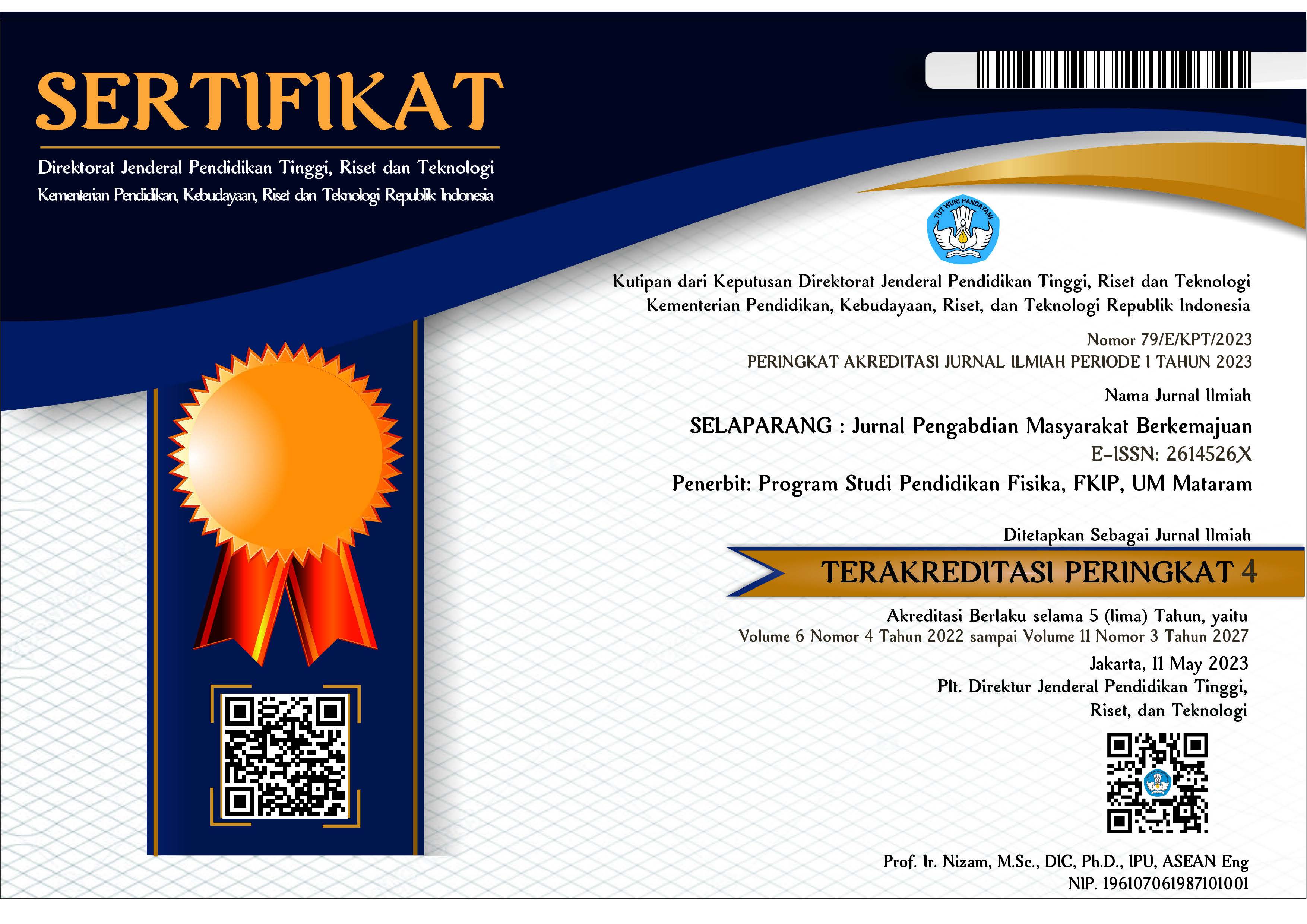PELATIHAN DAN PENDAMPINGAN PEMBELAJARAN DARING BERBASIS MOODLE UNTUK GURU FISIKA SMA DI KABUPATEN MALANG SELAMA MASA PANDEMI COVID-19
Abstract
ABSTRAK
Dampak dari pendemi covid-19 memaksa setiap sekolah mewajibkan guru dan siswanya melakukan pembelajaran secara daring dari rumah. Hal tersebut membuat guru dan siswa dalam waktu yang singkat harus mempersiapkan seluruh vasilitas pendukung pembelajaran. Sedangkan di Kabupaten Malang, para guru fisika masih belum begitu akrab dengan pembelajaran daring, maka pendampingan dan pelatihan pembelajaran daring dengan memanfaatkan moodle sangat dibutuhkan. Kegiatan diawali dengan studi literatur dan lapangan, perencanaan, pemberian materi, demosntrasi dan praktek dan diakhiri dengan kegiatan evaluasi. Untuk mengetahui keberhasilan program, kami menyebarkan kueisioner (n = 13 item) kepada seluruh peserta tentang persepsi terhadap pembelajaran menggunakan moodle dan memantau perkembangan pemahaman guru melalui moodle yang telah dikembangkan. Guru fisika didampingi dan dilatih untuk membuat pembelajaran daring melalui moodle dan variasi model moodle yang sudah pernah diperoleh. Peserta pelatihan dan pendampingan yang diselenggarakan secara daring berjumlah 40 guru fisika di wilayah Kabupaten Malang yang meliputi 34 orang guru fisika SMA dan 6 orang guru fisika MA. Walaupun kehadiran guru tidak bersamaan masuk room meet, tetapi setiap guru selalu masuk setiap hari. Namun, yang aktif mengerjakan pembuatan moodle hanya 25 orang guru yaitu 24 orang guru SMA dan 1 orang guru MA. Peserta yang membuat moodle tersebut bervariasi ada yang hanya membuat Assignment untuk materi dinamika, sampai ada yang lengkap membuat assignment, quiz, dan file untuk materi mekanika, dinamika, usaha dan energi, serta impuls dan momentum. Berdasarkan respon peserta pada angket terkait pelatihan dan pendampingan penyusunan moodle didapatkan 75,19% peserta merespon baik pembelajaran dengan moodle.
Kata kunci: pelatihan-pendampingan; moodle; pandemi covid-19; guru fisika..
ABSTRACT
The impact of covid-19 outbreaks forced every school to require teachers and students to do online learning from home. This makes teachers and students in a short time must prepare all the learning support facilities. While in Malang Regency, physics teachers are still not so good with online learning, so online learning assistance and training by utilizing moodle is needed. The programme have began with literature and field research, planning, materials provision, demonstrations, and practices, and concludes with evaluation. To assess the program's performance, we provided a questionnaire (n = 13 questions) to all participants regarding their perceptions of learning with Moodle and simplifying the teacher's knowledge through the produced Moodle. Physics teachers are accompanied and trained to make online learning through moodle and variations of moodle models that have been obtained. The trainees and mentoring held online amounted to 40 physics teachers in malang regency which included 34 high school physics teachers and 6 MA physics teachers. Although the presence of teachers does not coincide with entering the room meet, but every teacher always enters every day. However, who actively do the creation of moodle only 25 teachers, namely 24 high school teachers and 1 MA teacher. Participants who make the moodle vary there are only making Assignments for dynamic materials, until there are complete assignments, quis, and files for mechanical materials, dynamics, work and energy, as well as impulses and momentum. Based on the participants' responses to the questionnaire related to training and mentoring in the preparation of moodle, it was found that 75.19% of participants responded well to learning with moodle.
Keywords: training- mentoring; moodle, pandemic covid-19; physics teacher.
Keywords
Full Text:
PDFReferences
Affandi, M. R., Widyawati, M., & Bhakti, Y. B. (2020). ANALISIS EFEKTIVITAS MEDIA PEMBELAJARAN E-LEARNING DALAM MENINGKATKAN HASIL BELAJAR SISWA SMA PADA PELAJARAN FISIKA. Jurnal Pendidikan Fisika, 8(2), 150. https://doi.org/10.24127/jpf.v8i2.2910
Anggraeni, D. M., & Sole, F. B. (2018). E-Learning Moodle, Media Pembelajaran Fisika Abad 21. Jurnal Penelitian Dan Pengkajian Ilmu Pendidikan: E-Saintika, 1(2), 57. https://doi.org/10.36312/e-saintika.v1i2.101
Asrial, A., Syahrial, S., Maison, M., Kurniawan, D. A., & Piyana, S. O. (2020). Ethnoconstructivism E-Module to Improve Perception, Interest, And Motivation of Students in Class V Elementary School. JPI (Jurnal Pendidikan Indonesia), 9(1), 30–41. https://doi.org/10.23887/jpi-undiksha.v9i1.19222
Cahyani, A., Listiana, I. D., & Larasati, S. P. D. (2020). Motivasi Belajar Siswa SMA pada Pembelajaran Daring di Masa Pandemi Covid-19. IQ (Ilmu Al-Qur’an): Jurnal Pendidikan Islam, 3(01), 123–140. https://doi.org/10.37542/iq.v3i01.57
Conde, M. Á., & Fonseca, D. (2018). Information society skills: Is knowledge accessible for all? Part I. Universal Access in the Information Society, 17(2), 223–227. https://doi.org/10.1007/s10209-017-0547-7
De Medio, C., Limongelli, C., Sciarrone, F., & Temperini, M. (2020). MoodleREC: A recommendation system for creating courses using the moodle e-learning platform. Computers in Human Behavior, 104, 106168. https://doi.org/10.1016/j.chb.2019.106168
Distante, D., Villa, M., Sansone, N., & Faralli, S. (2020). MILA: A SCORM-Compliant Interactive Learning Analytics Tool for Moodle. 2020 IEEE 20th International Conference on Advanced Learning Technologies (ICALT), 169–171. https://doi.org/10.1109/ICALT49669.2020.00056
Đukić-Mirzajanc, M. (2019). The effectiveness of learning German on Moodle. Inovacije u Nastavi, 32(3), 130–150. https://doi.org/10.5937/inovacije1903130D
Fayanto, S.-, Kawuri, M. Y. R. T., Jufriansyah, A., Setiamukti, D. D., & Sulisworo, D. (2019). Implementation E-Learning Based Moodle on Physics Learning in Senior High School. Indonesian Journal of Science and Education, 3(2), 93. https://doi.org/10.31002/ijose.v3i2.1178
Firman & Rahman. (2020). Pembelajaran Online di Tengah Pandemi Covid-19. 2020, 02, 9.
Hasan, N., & Bao, Y. (2020). Impact of “e-Learning crack-up” perception on psychological distress among college students during COVID-19 pandemic: A mediating role of “fear of academic year loss.” Children and Youth Services Review, 118, 105355. https://doi.org/10.1016/j.childyouth.2020.105355
Jusuf, H., Sobari, A., & Fathoni, M. (2020). Pengaruh Pembelajaran Jarak Jauh Bagi Siswa SMA Di Era Covid-19: -. Jurnal Kajian Ilmiah, 1(1), 15–24. https://doi.org/10.31599/jki.v1i1.212
Kemdikbud. (2020). PERATURAN MENTERI PENDIDIKAN DAN KEBUDAYAAN REPUBLIK INDONESIA NOMOR 3 TAHUN 2020 TENTANG STANDAR NASIONAL PENDIDIKAN TINGGI.
Kerimbayev, N., Nurym, N., Akramova, А., & Abdykarimova, S. (2020). Virtual educational environment: Interactive communication using LMS Moodle. Education and Information Technologies, 25(3), 1965–1982. https://doi.org/10.1007/s10639-019-10067-5
Manan, N. A., Emzir, & Rahmat, A. (2020). Moodle-Based Speaking Learning Model. Journal of Physics: Conference Series, 1477, 042009. https://doi.org/10.1088/1742-6596/1477/4/042009
Muliyati, D., Bakri, F., & Ambarwulan, D. (2018). APLIKASI ANDROID MODUL DIGITAL FISIKA BERBASIS DISCOVERY LEARNING. WaPFi (Wahana Pendidikan Fisika), 3(1), 74. https://doi.org/10.17509/wapfi.v3i1.10944
Ngibad, K., Herawati, D., Ekawati, E. R., & Pradana, M. S. (2020). Pelatihan E-learning berbasis Moodle untuk Dosen-Dosen Fakultas Ilmu Kesehatan Universitas Maarif Hasyim Latif Sidoarjo. Darmabakti : Jurnal Pengabdian Dan Pemberdayaan Masyarakat, 1(1). https://doi.org/10.31102/darmabakti.2020.1.1.13.-18
Papadakis, S., Kalogiannakis, M., Sifaki, E., & Vidakis, N. (2018). Evaluating Moodle use via Smart Mobile Phones. A case study in a Greek University. EAI Endorsed Transactions on Creative Technologies, 5(16), 156382. https://doi.org/10.4108/eai.10-4-2018.156382
Schweighofer, J., Taraghi, B., & Ebner, M. (2019). Development of a Quiz – Implementation of a (Self-) Assessment Tool and its Integration in Moodle. International Journal of Emerging Technologies in Learning (IJET), 14(23), 141. https://doi.org/10.3991/ijet.v14i23.11484
Septian Raibowo & Yahya Eko Nopiyanto. (2020). PROSES BELAJAR MENGAJAR PJOK DI MASA PANDEMI COVID-19. STAND : Journal Sports Teaching and Development, 1(2), 112–119. https://doi.org/10.36456/j-stand.v1i2.2774
Subekti, A. S., & Kurniawati, L. A. (2020). Pelatihan Mendesain Pembelajaran Daring Menarik Selama Pandemi Covid-19 dengan Teknologi Pembelajaran Sederhana. Dinamisia : Jurnal Pengabdian Kepada Masyarakat, 4(4), 588–595. https://doi.org/10.31849/dinamisia.v4i4.4679
Surahman, E. (2019). INTEGRATED MOBILE LEARNING SYSTEM (IMOLES) SEBAGAI UPAYA MEWUJUDKAN MASYARAKAT PEBELAJAR UNGGUL ERA DIGITAL. JINOTEP (Jurnal Inovasi Dan Teknologi Pembelajaran) Kajian Dan Riset Dalam Teknologi Pembelajaran, 5(2), 50–56. https://doi.org/10.17977/um031v5i22019p050
Umiyatun, U., Purnomo, M. E., & Indrawati, S. (2020). Moodle Based Worksheet on Scientific Article Writing: A Students Perceptions. Jurnal Pendidikan Progresif, 10(1), 117–132. https://doi.org/10.23960/jpp.v10.i1.202013
Wijiastuti, A., Roesminingsih, M. V., Ardianingsih, F., Masithoh, S., Riyanto, E., & Andajani, S. J. (2019). Design Science Education for Student with Special Needs Use Learning Management System Platform Moodle. 2019 5th International Conference on Education and Technology (ICET), 94–97. https://doi.org/10.1109/ICET48172.2019.8987207
Zabolotniaia, M., Cheng, Z., Dorozhkin, E., & Lyzhin, A. (2020). Use of the LMS Moodle for an Effective Implementation of an Innovative Policy in Higher Educational Institutions. International Journal of Emerging Technologies in Learning (IJET), 15(13), 172. https://doi.org/10.3991/ijet.v15i13.14945
DOI: https://doi.org/10.31764/jpmb.v5i1.6060
Refbacks
- There are currently no refbacks.

This work is licensed under a Creative Commons Attribution-ShareAlike 4.0 International License.
______________________________________________________
Jurnal Selaparang
p-ISSN 2614-5251 || e-ISSN 2614-526X
EDITORIAL OFFICE:



















